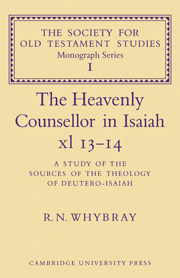Book contents
- Frontmatter
- Contents
- Acknowledgements
- Abbreviations
- Introduction
- I The context
- II Detailed interpretation
- III Literary characteristics
- IV Israelite kings and their councils
- V The origin of the divine council
- VI The assembly of the gods in Canaan
- VII The council of Yahweh in Israel
- VIII Yahweh and his advisers
- IX The office of counsellor
- X The divine counsellor in Babylonian myth
- XI Summary and conclusions
- Index of biblical references
- Index of authors cited
V - The origin of the divine council
Published online by Cambridge University Press: 08 March 2010
- Frontmatter
- Contents
- Acknowledgements
- Abbreviations
- Introduction
- I The context
- II Detailed interpretation
- III Literary characteristics
- IV Israelite kings and their councils
- V The origin of the divine council
- VI The assembly of the gods in Canaan
- VII The council of Yahweh in Israel
- VIII Yahweh and his advisers
- IX The office of counsellor
- X The divine counsellor in Babylonian myth
- XI Summary and conclusions
- Index of biblical references
- Index of authors cited
Summary
This image of the divine council is not simply a poetic image invented by Deutero-Isaiah as a means of expressing his message more forcibly. The concept of an assembly or council of divine beings in heaven presided over by a king or chief god was a regular feature of the religions of the ancient Near East from very early times. In polytheistic religions something of the kind was almost inevitable: it was necessary that the mutual relationships of the various gods, their functions and their relative importance should be defined. This could only be done on the assumption that the divine society was organised along lines similar to the organisation of human society.
The existence of such an assembly in human society in the ancient Near East from very early times has recently been demonstrated. The earliest type of city government in Sumer took the form of an assembly (unkin) of all the free, adult citizens, in whose hands resided ultimate sovereignty. Rulers and magistrates were appointed by it, derived their authority from it, and could be deposed by it. Although the demands of efficiency and in particular the urge for foreign conquest very quickly led to the supersession of this form of government by the autocracy of one man who held permanent office as king, some features of democratic government, especially in judicial matters, persisted in the cities of Mesopotamia right through the period of the great Semitic empires, and were even reinforced in the early second millennium with the arrival of new elements of Semitic population whose form of local government was of a similar character.
- Type
- Chapter
- Information
- The Heavenly Counsellor in Isaiah xl 13-14A Study of the Sources of the Theology of Deutero-Isaiah, pp. 34 - 36Publisher: Cambridge University PressPrint publication year: 1971
- 1
- Cited by

